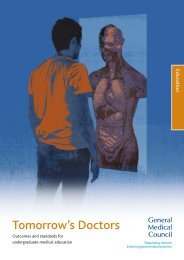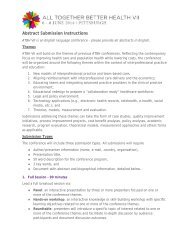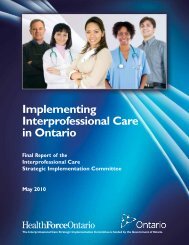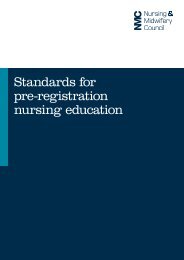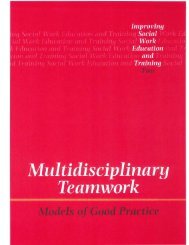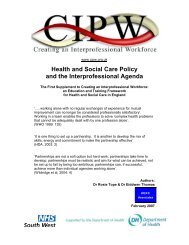Interprofessional Mentoring Guide - Alberta Health Services
Interprofessional Mentoring Guide - Alberta Health Services
Interprofessional Mentoring Guide - Alberta Health Services
You also want an ePaper? Increase the reach of your titles
YUMPU automatically turns print PDFs into web optimized ePapers that Google loves.
IP Competencies<br />
<strong>Interprofessional</strong> Conflict Resolution<br />
Students/practitioners actively engage self and others, including the client/<br />
patient/family, in positively and constructively addressing disagreements<br />
as they arise. To support interprofessional collaboration, team members<br />
consistently address conflict in a constructive manner by:<br />
• valuing the potential positive nature of conflict recognizing the potential for<br />
conflict to occur and taking constructive steps to address it<br />
• identifying common situations that are likely to lead to disagreements or<br />
conflicts, including role ambiguity, power gradients, and differences in goals<br />
• knowing and understanding strategies to deal with conflict<br />
• setting guidelines for addressing disagreements<br />
• effectively working to address and resolve disagreements, including analyzing<br />
the causes of conflict and working to reach an acceptable solution<br />
• establishing a safe environment in which to express diverse opinions<br />
• developing a level of consensus among those with differing views<br />
• allowing all members to feel their viewpoints have been heard no matter<br />
what the outcome<br />
Collaborative Leadership<br />
Students/practitioners understand and can apply leadership principles<br />
that support a collaborative practice model. This domain supports shared<br />
decision-making as well as leadership but it also implies continued individual<br />
accountability for one’s own actions, responsibilities and roles as explicitly<br />
defined within one’s professional/disciplinary scope of practice. To support<br />
interprofessional collaboration, students/practitioners collaboratively<br />
determine who will provide group leadership in any given situation by<br />
supporting:<br />
• work with others to enable effective patient/client outcomes<br />
• advance interdependent working relationships among all participants<br />
• facilitate effective team processes<br />
• facilitate effective decision-making<br />
• establish a climate for collaborative practice among all participants<br />
• co-create a climate for shared leadership and collaborative practice<br />
• apply collaborative decision-making principles<br />
• integrate the principles of continuous quality improvement to work processes<br />
and outcomes<br />
Patient/Client/Family/Community-Centred Care<br />
Students/practitioners seek out, integrate and value, as a partner, the input<br />
and the engagement of the patient/client/family/community in designing and<br />
implementing care/services. To support interprofessional collaboration that is<br />
patient/client/family-centred, learners/practitioners need to:<br />
• support the participation of patients/clients, their families and/or community<br />
representatives as integral partners alongside with healthcare personnel<br />
• share information with patients/clients/or family in a respectful manner and<br />
in such a way that it is understandable, encourages discussion, and enhances<br />
participation in decision-making<br />
• ensure that appropriate education and support is provided to patients/<br />
clients/family and others involved with care or service<br />
• listen respectfully to the expressed needs of all parties in shaping and<br />
delivering care or services<br />
<strong>Interprofessional</strong> Communication<br />
Students/practitioners from different professions communicate with each<br />
other in a collaborative, responsive and responsible manner. To support<br />
interprofessional collaboration, students/practitioners are able to:<br />
• establish team work communication principles<br />
• actively listen to other team members including patients/clients/families<br />
• communicate to ensure common understanding of care decisions<br />
• develop trusting relationships with patients/clients/families and other team<br />
members<br />
• effectively use information and communication technology to improve<br />
interprofessional patient/client/community-centred care




